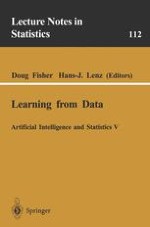1996 | OriginalPaper | Buchkapitel
Statistical Analysis of Complex Systems in Biomedicine
verfasst von : Harry B. Burke, M.D., Ph.D.
Erschienen in: Learning from Data
Verlag: Springer New York
Enthalten in: Professional Book Archive
Aktivieren Sie unsere intelligente Suche, um passende Fachinhalte oder Patente zu finden.
Wählen Sie Textabschnitte aus um mit Künstlicher Intelligenz passenden Patente zu finden. powered by
Markieren Sie Textabschnitte, um KI-gestützt weitere passende Inhalte zu finden. powered by
The future explanatory power in biomedicine will be at the molecular-genetic level of analysis (rather than the epidemiologic-demographic or anatomic-cellular levels). This is the level of complex systems. Complex systems are characterized by nonlinearity and complex interactions. It is difficult for traditional statistical methods to capture complex systems because traditional methods attempt to find the model that best fits the statistician’s understanding of the phenomenon; complex systems are difficult to understand and therefore difficult to fit with a simple model. Artificial neural networks are nonparametric regression models. They can capture any phenomena, to any degree of accuracy (depending on the adequacy of the data and the power of the predictors), without prior knowledge of the phenomena. Further, artificial neural networks can be represented, not only as formulae, but also as graphical models. Graphical models can increase analytic power and flexibility. Artificial neural networks are a powerful method for capturing complex phenomena, but their use requires a paradigm shift, from exploratory analysis of the data to exploratory analysis of the model.
